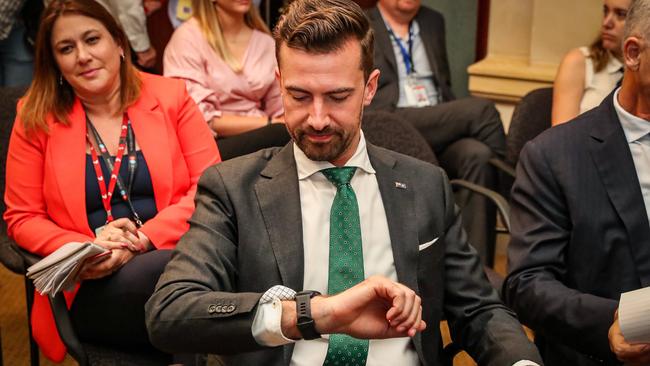Libs at a loss on campaign policy costs
His party already facing heavy defeat at polls on Saturday, WA LNP treasury spokesman struggles with election costings.

WA’s embattled Liberal Party has come under renewed fire after its Treasury spokesman struggled to answer basic questions about the costs of its controversial election promises.
With the party already facing a heavy defeat at Saturday’s state election, Sean L’Estrange battled to detail the cost of major election promises, including the shutdown of the state’s coal-fired power plants, plans for 2600 new social houses and the sinking of a section of rail line.
The party said its total election commitments would cost just $1.4bn over the four-year forward estimates, well short of the almost $7bn cost estimated by the Labor government. It was also far short of the $2.4bn of Labor’s own election promises, a surprise given Labor’s much more modest policy announcements.
A lengthy and at-times farcical press conference shed further light on the deep divisions with the Liberal Party over the “new energy, new jobs” policy unveiled by Opposition Leader Zak Kirkup and energy spokesman David Honey earlier in the campaign. The policy has drawn open criticism not just from the Labor government but also from federal Liberal MPs, existing Liberal state MPs and Liberal candidates.
Mr L’Estrange appeared to try to distance himself from the plan, continually deferring questions about the cost to Dr Honey, and repeatedly refrained from detailing the costs of individual policy commitments. “If you want me to roll that in a spreadsheet with every individual policy right here now for this presentation, that was not the purpose of this presentation,” he said.
WA’s outgoing Treasurer Ben Wyatt described the press conference as “shambolic”.
“It was like watching the Three Stooges pass around a ticking time bomb. Sean L’Estrange didn’t want to talk about it, Zak Kirkup didn’t understand it, and David Honey threw himself upon it,” he said. “I’ve never seen anything so bad around a signature policy announced by any political party, let alone the WA Liberals who have clearly announced a policy that is causing great discontent but nobody seems to understand.”
Labor has warned that the energy policy — which would involve the early shutdown of two coal-fired power plants, the paying out of long-term contracts, and the development of large-scale renewable and hydrogen projects — at as much as $16bn, although the Liberal costings only included $260m primarily focused on trying to attract private-sector investment.
Calls from the Liberals for $10,000 support packages for small businesses were not included in the costings, while there was only $120m towards the $1.9bn Roe 8-9 transport corridor plan which the party has promised to begin within 100 days of being elected. Even with the federal government committing $1.2bn to the project, there appeared to be a significant shortfall in the forecast cost.
The Liberals commissioned accounting firm Hall Chadwick to analyse its policies, although a letter from the firm specified that the review entailed only a check of the “mathematical compilation” provided by the party.
Asked about the apparent under-costing of many of the party’s election promises, Mr L’Estrange said much of the planned spending was expected to fall outside the forward estimates. He noted that an estimated $10bn worth of Labor promises — namely the ongoing Metronet rail project and a new outer harbour at Kwinana — would also fall outside that time frame.
Thursday’s performance could reopen the scars the party has been carrying since state debt ballooned under Colin Barnett’s government. While the Labor government has continually accused the previous Liberal government of “bankrupting” WA when it was in power, the similar levels of debt still on the books after four years of Labor government were described as “more than reasonable” by Mr Wyatt.




To join the conversation, please log in. Don't have an account? Register
Join the conversation, you are commenting as Logout